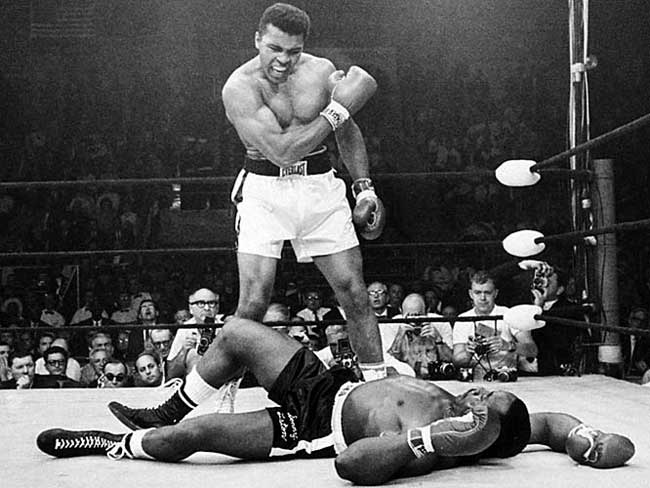Muhammad Ali and the The Rumble in the Jungle
“You think the world was shocked when Nixon resigned, wait till I whup George Foreman’s behind.”
Forty-one years ago today, Louisville native Muhammad Ali took on up-and-coming boxer George Foreman in the nation then known as Zaire. The stakes were $5 million put up by dictator Mobutu Sese Seko. The fight was one of the very first promoted by a brash young man named Don King. The Rumble in the Jungle, as the fight was billed, would be remembered as one of the greatest sporting events of all time.
Ali, whom all Kentuckians and boxing fans now know as The Greatest, was the unanimous underdog in the fight. After an amazing start in the early 1960s, including achieving the title of World Heavyweight Champion at 22, Ali had faced years of backlash. He'd been stripped of his title and suspended from boxing for three and a half years following a conviction of draft evasion. Ali's opposition to the Vietnam war established the athlete as a counterculture icon, but did little to further his boxing career; he lost some of the most valuable years of physical capacity to the lengthy legal appeals process. Ali resumed training in 1971 and, despite victories including a unanimous decision win over Joe Frazier only a few months prior, he was considered too old (at 32) and small to beat the muscular, talented, 25 year-old Foreman.
Don King, along with an international crew of investors and promoters, made sure that the event received epic billing. A three day music festival known as Zaire 74, with a lineup of legendary musicians like B.B. King, James Brown, and Bill Withers, was planned. Foreman and Ali spent much of the summer of 1974 training in Zaire for a fight which was slated to occur on September 25th. After Foreman suffered a cut near his eye during training, the fight was rescheduled for October 30th.
James Brown in a still from the documentary Soul Power, via the New York Times.
The narrative of the fight presented the cocky, glib and charming Ali against the silent, brooding Foreman. Ali's stance as a conscientious objector to the Vietnamese conflict struck a chord with the young and hip, while Foreman, who'd proudly waved the American flag at the 1968 Mexico City Olympics, seemed out of touch with his generation. Ali won the hearts of the people of Zaire, speaking against the European imperialism against which the locals (formerly inhabitants of the Belgian Congo) had revolted a decade earlier. When Foreman arrived with his pet German Shepherd, the local crowd reacted to the dog, which many associated with Belgian oppression.
AP File Photo
While sports fans and boxing insiders considered a Foreman victory to be a foregone conclusion, Ali shocked the world by employing his rope-a-dope strategy to wear Foreman down and avoid direct contact from the more muscular fighter. Ali's choreographedi footwork and brash proclamations -- in the greatest instance of trash talk ever, Ali hurled psychological taunts like "They told me you could punch, George!" and "Is that all you've got, George?" -- wore Foreman down as much as Ali's well-timed punches. The fight ended in the eighth round, Ali threw a right hook to Foreman's face, followed by a hard right that took the younger fighter down. Ali emerged victorious, beating the odds in what would become the most famous boxing match of all time.
Today, the political overtones of the fight hold a far different connotation. It's hard to imagine a time when Ali wasn't a beloved humanitarian, or when Foreman wasn't the guy who sold grills and named all his kids "George." The Rumble in the Jungle remains a fascinating story of African sociopolitical history, popular culture, and the greatest underdog story in sports.
As always, here's to the Greatest! Muhammad Ali continues to inspire Kentuckians in so many ways!

